A former senior Chinese Communist Party official said in an interview published Thursday that the totalitarian regime would have the final say on who succeeds the current Dalai Lama, the head of Tibetan Buddhism.
The Dalai Lama is the highest authority in Tibetan Buddhism and is considered a reincarnation of Buddha himself. The current Dalai Lama, Tenzin Gyatso, is the fourteenth of his line and has held the title since 1940. According to the faith, the Dalai Lama chooses who to reincarnate into following his death, or if he will reincarnate at all. The Dalai Lama is the highest of several “living Buddhas” – people considered to carry Buddha within them.
In 1995, the Communist Party disappeared another living Buddha, the Panchen Lama, at age six, replacing him with a communist-approved choice. The Party insists the original boy is alive and living peacefully in anonymity but has never offered any evidence of this, and no one has been able to independently verify the safety and whereabouts of the boy.
The current Dalai Lama is 87 years old. His advanced age has generated significant concern among Tibetan Buddhists regarding who will succeed him and how the Communist Party will react.
The Chinese Communist Party is officially atheist and anti-religion. It allows only five religions to legally operate in China, and only under its control and as tools of pro-regime propaganda: Buddhism, Islam, Taoism, Catholicism (without Vatican authority), and Protestant Christianity. Regime Buddhist authorities enthusiastically support the Communist Party and denounce the Dalai Lama as a rogue party running afoul of the faith.
The Dalai Lama has lived in exile in India for decades. In occupied Tibet, open support for the Dalai Lama from Buddhists could result in arrest and other legal repercussions.
Zhu Weiqun, a former Communist Party religious affairs official, reiterated to the state-run Global Times propaganda outlet on Thursday that, upon the death of the current Dalai Lama, the Communist Party would move swiftly to choose a replacement aligned with the interests of Beijing. Zhu was commenting on a recent interview with a Tibetan exile leader warning the world of precisely this potential development.
According to the Global Times, Zhu said that China’s usurpation of Buddhist authority would be to offer “support and guide the work of finding the successor of the 14th Dalai Lama.” Zhu and other alleged “experts” insisted that the Chinese government would have to “finally approve” anyone identified as the next Dalai Lama.
Zhu claimed that previous Chinese governments, prior to communism, had played a role in choosing living Buddhas, so “this has already shown that the highest authority on the issue of the Dalai’s succession does not belong to anyone, but is within the authority of the central government.”
Zhu went on to condemn the Dalai Lama for having “betrayed the motherland” by rejecting communism and Chinese colonialism in Tibet.
“He betrayed the motherland, trying in vain to turn the power belonging to the central government into his personal right, in order to achieve his separatist goals,” Zhu said. “He also betrayed Tibetan Buddhism by trying to destroy its historical conventions. He turned Tibetan Buddhism into a tool of separatism.”
The Communist Party refers to supporters of decolonizing Tibet as “separatists.” Tibetans have denounced both the lack of sovereignty for their territory and widespread discriminatory abuses against ethnic Tibetans as reasons that it is impossible for Tibetans to live peacefully under the Communist Party. Chinese dictator Xi Jinping – who is currently enforcing similar policies at a larger scale in neighboring East Turkistan – has for the past decade launched campaigns to erase the Tibetan language, separate Tibetan children from their parents to raise them ethnically Han, and imprisoned as many as half a million Tibetans in concentration camps.
Zhu’s tirade to the Global Times was a response to the president of Tibet’s government-in-exile, Penpa Tsering, warning the world in a recent interview with the south Asian news service PTI that China would “definitely interfere” in the process of finding the fifteenth Dalai Lama once the current incarnation passes away.
“What happens after the present Dalai Lama is no more is a big challenge for the Tibetans, especially if the Sino-Tibetan conflict is not resolved,” Tsering told PTI.
“We believe China will definitely interfere with the succession process of the Dalai Lama… They have been preparing for that for the last 15 years,” he asserted.
Tsering raised the issue of the missing Panchen Lama as an example of what he believed the communists would attempt to do following the Dalai Lama’s death.
“They (the Chinese) intervened in 1995 when they chose a boy (Gyancain Norbu) as the Panchen Lama,” Tsering narrated. “The boy recognized by His Holiness (the Dalai Lama) as Panchen Lama (Gedhun Choeyi Nyima) was whisked away and we still have no news of whether he is alive.”
Nyima was six when the current Dalai Lama identified him as the Panchen Lama. He and his entire family disappeared shortly thereafter. He has not been seen in public since May 1995.
In 2015, Chinese government officials claimed that no one had seen Nyima in public because he “does not want to be disturbed” but that he was “growing up healthily” and living a happy life. Beijing offered no proof that Nyima is alive.
In his interview, Tsering said that his government-in-exile had organized a 14-point plan to respond to China’s usurpation of Buddhist authority following the Dalai Lama’s death.

COMMENTS
Please let us know if you're having issues with commenting.